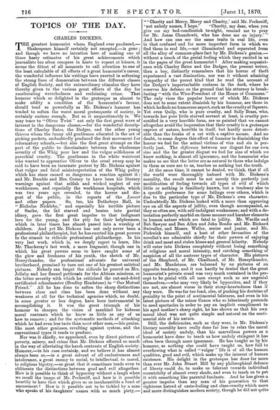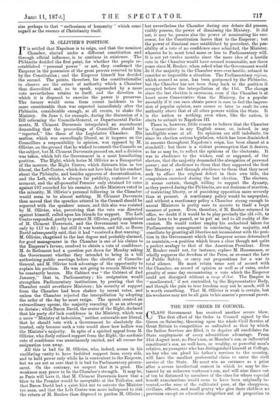TOPICS OF THE DAY.
CHARLES DICKENS. THE greatest humourist whom England ever produced,— Shakespeare himself certainly not excepted,—is gone ; and though we have no intention here of making one of those hasty estimates of his great achievements which journalists too often compose in haste to repent at leisure, it seems the fittest of all moments to call attention to one of the least calculable of all effects of a great humourist's career, the wonderful influence his writings have exerted in softening the strong lines of demarcation between the different classes of English Society, and the extraordinary stimulus they have thereby given to the various great efforts of the day for ameliorating wretchedness and reclaiming crime. That humour which so delighted in the grotesque as almost to make oddity a condition of the humourist's favour, should tend so powerfully as Mr. Dickens's humour has tended to soften the worst moral grotesquerie of society, is certainly curious enough. But so it unquestionably is. We may trace to " Oliver Twist " not only the first great wave of interest in the dangerous classes,—for the wonderful descrip- tions of Charley Bates, the Dodger, and the other young thieves whom the funny old gentleman educated in the art of picking pockets, undoubtedly produced the first movement for reformatory schools,—but also the first great attempt on the part of the public to discriminate between the wholesome severity of the Whig poor law and the vulgar selfishness of parochial cruelty. The gentleman in the white waistcoat who wanted to apprentice Oliver to the cruel sweep may be said to have been an incarnate protest by Mr. Dickens against that vulgar and fatal misinterpretation of the Whig policy which has since caused so dangerous a reaction against it ; and Mr. Bumble and Mrs. Corney to have been his literary warnings against that selfish and wicked neglect of our workhouses, and especially the workhouse hospitals, which was two years ago revealed, to the horror and dis- gust of the public, in the reports of the Lancet and other papers. So, too, his Dotheboys Hall, in " Nicholas Nickleby," and especially his terrible picture of Smike, the lad starved and beaten into partial idiocy, gave the first great impulse to that indignant love for the young, and the pity for their helplessness, which in later times has almost passed into a worship of children. And yet Mr. Dickens has not only never been a professional philanthropist, but he has exerted his great powers to the utmost to ridicule professional philanthropy. In his very last work, which is, we deeply regret to learn, like Mr. Thackeray's last work, a mere fragment, though one in which his great powers seem to have caught some of the glow and freshness of his youth, the sketch of Mr. Honeythunder, the professional advocate for universal brotherhood, promised to turn out one of his greatest satirical pictures. Nobody can forget the ridicule he poured on Mrs. Jellaby and her flannel petticoats for the African missions, or the bitter severity with which he criticized the cut-and-dried certificated schoolmaster (Bradley Headstone) in "Our Mutual Friend." All he has done to soften the sharp distinctions between class and class has been done without any weakness at all for the technical agencies which, no doubt, in some greater or less degree, have been instrumental in accomplishing it. It was the great triumph of his humour to sharpen the vision of mankind for hideous moral contrasts which he knew as little as any of us how to remove ; and for the systematic methods of attacking which he had even less taste than most other men,—his genius, like most other geniuses, revolting against system, and the conventional types it tends to produce. Nor was it chiefly, we apprehend, even by direct pictures of poverty, misery, and crime that Mr. Dickens effected so much in the way of alleviating the harsh contrasts of English society. Humour,—in his case certainly, and we believe it has almost always been so,—is a great solvent of all exclusiveness and intolerance, a great enemy to social, to intellectual, to moral, to religious bigotry,—so great that it sometimes tends even to obliterate the distinctions between good and evil altogether. How is it possible to think of hypocrisy without a laugh when we recall the image of Mr. Pecksniff, and how is it possible heartily to hate that which gives us so inexhaustible a fund of amusement V How is it possible not to be tickled by a man who speaks of his daughters' names with so much piety,— " Charity and Mercy, Mercy and Charity,' said Mr. Pecksniff, not unholy names, I hope.' Charity, my dear, when you give me my bed-candlestick to-night, remind me to pray for Mr. Jonas Chuzzlewit, who has done me an injury.' " And how can one see the same traits in real life, even in that confused and far more imperfect form in which we find them in real life,—not illuminated and separated from all the alloy of common-place fact by Mr. Dickens's genius,— without a touch of the genial feeling which they excited in us in the pages of the great humourist ? After making acquaint- ance with Charley Bates and the Dodger, the present writer, then a boy, distinctly remembers that his horror of theft experienced a vast diminution, nor was it without admiring sympathy of the purest kind that he read the account of the Dodger's imperturbable coolness in the dock, where ha reserves his defence on the ground that his attorney is break- fasting "with the Wice-President of the House of Commons." The only vices the popular horror of which Mr. Dickens does not to some extent diminish by his humour, are those in which he finds no humorous aspect, such as the cruelty of Squeers. Yet even Quilp, who is pure cruelty, and Sally Brass, who towards her poor little starved servant at least, is cruelty per- sonified in a very horrible form, are so painted that we cannot altogether avoid the impression that their cruelty is a grotesque caprice of nature, horrible in itself, but hardly more detest- able than the freaks of a cat with a captive mouse. And no doubt, to some degree this effect of humour in diminishing the horror we feel for the actual victims of vice and sin is per- fectly just. The difference between our disgust for our own sins and the far greater disgust we feel for sins of which we know nothing, is almost all ignorance, and the humourist who makes us see that the latter are as natural to those who indulge in them as ours are to us, teaches us nothing but the truth.
At the same time, it cannot be denied, we think, that if all the world were thoroughly imbued with Mr. Dickens's, morality, the result must be not merely this perfectly just modification of feeling towards all types of evil of which little or nothing is familiarly known, but a tendency also to a specific preference for some failings over others, which is due to the particular type of Mr. Dickens's own character. Undoubtedly Mr. Dickens looked with a more than approving eye on all the aspects of jollity, even though accompanied, as they so often are, with self-indulgent weaknesses; and with a de- testation perfectly morbid on those meaner and harsher elements in human nature which are fatal to jollity. Mr. Wardle and. Bob Sawyer and Ben Allen and John Brodie and Mr. Richard Swiveller, and Messrs. Weller, senior and junior, and Mr. Pickwick himself, and a host of other favourites of the novelist's are admirable chiefly for their powers of enjoying drink and meat and stolen kisses and general hilarity. Nobody will enter into Dickens completely without losing something of religious and moral intensity, and catching something of suspicion of all the austerer types of character. His pictures of the Shepherd, of Mr. Chadband, of Mr. Honeythunder, and Mr. Murdstone, are balanced by no pictures of an opposite tendency, and it can hardly be denied that the great humourist's private creed was very much contained in the pre- cept to be genial with all men except such as are ungenial themselves,—who may very likely be hypocrites, and if they are not, are almost worse in their stony-heartedness than if they were. He was far too fond, also, of pushing his doctrine of geniality to the point of sentimental falseness, and even in hia latest picture of the minor Canon who so laboriously pretends to need spectacles in order to pay an implicit compliment be his aged mother's sharp sight, he has shown us that his own moral ideal was not quite simple and natural on the senti- mental side of his nature.
Still, the deficiencies, such as they were, in Mr. Dickens's literary morality have really done far less to relax the moral ideal of society unduly, than his marvellous powers as a humourist have done to teach us how unduly stringent it has often been through mere ignorance. He has taught us by his humour, as nothing else could have taught us, how full to overflowing what is called "vulgar " life is of all the human qualities, good and evil, which make up the interest of human existence. His delight in the grotesque has done far more than ever Mr. John Stuart Mill by any philosophical defence of liberty could do, to make us tolerant towards individual eccentricity of almost every shade, and even to teach us to pet it with something like parental fondnels. And he has given a greater impulse than any man of his generation to that righteous hatred of caste-feeling and class-cruelty which more and more distinguishes modern society, though he did not quite rise perhaps to that " enthusiasm of humanity " which some regard as the essence of Christianity itself.































 Previous page
Previous page